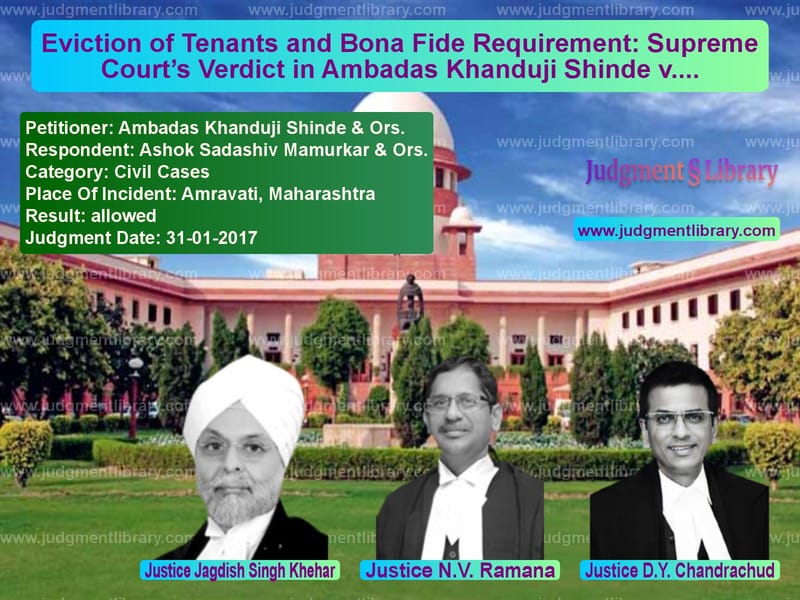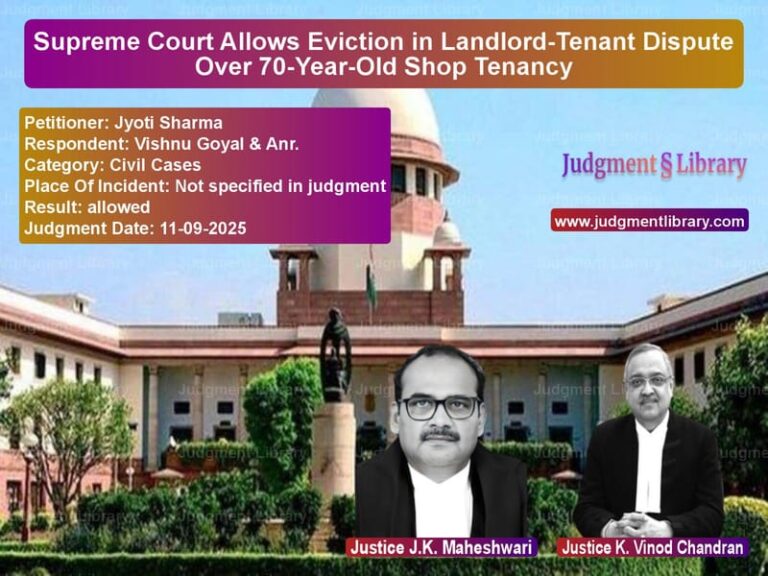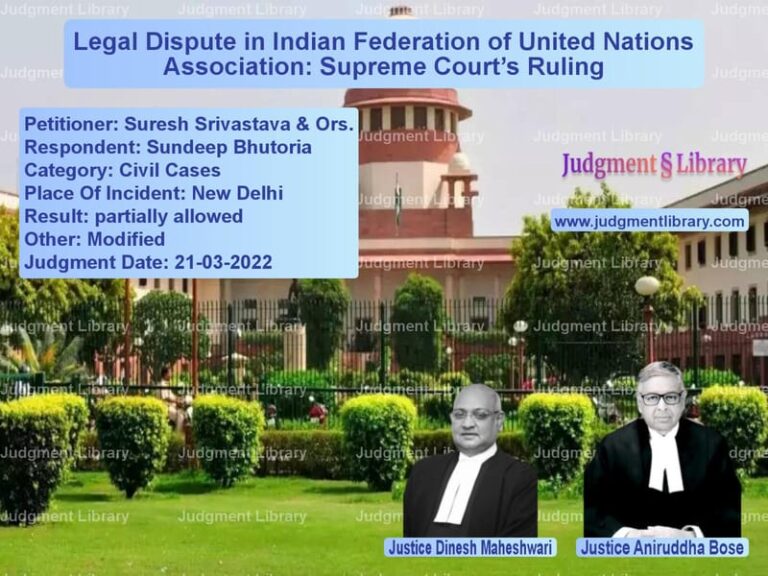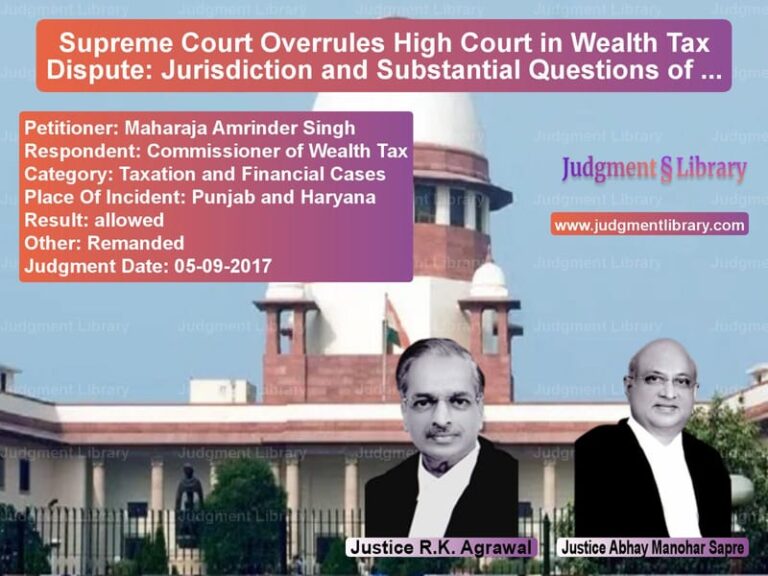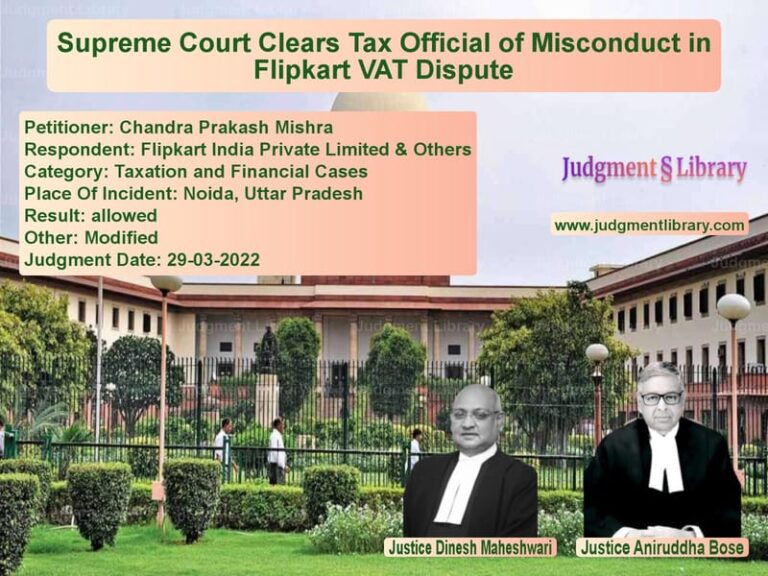Eviction of Tenants and Bona Fide Requirement: Supreme Court’s Verdict in Ambadas Khanduji Shinde v. Ashok Sadashiv Mamurkar
Introduction
The case of Ambadas Khanduji Shinde & Ors. v. Ashok Sadashiv Mamurkar & Ors. revolves around a landlord-tenant dispute concerning eviction based on bona fide requirement, willful default, and change of use of the premises. The Supreme Court examined whether the High Court was justified in overturning the concurrent findings of the lower courts and whether the tenants were obligated to vacate the premises.
Background of the Case
The appellants, Ambadas Khanduji Shinde & Others, were landlords who sought eviction of the tenants from a commercial property located in Amravati. The suit premises were originally rented for a curd business at a monthly rent of Rs. 200. Over time, the tenants changed the nature of the business to a travel agency without obtaining prior permission from the landlords. Additionally, the landlords alleged that the tenants had defaulted in rent payments from January 2001 to April 2005. They also claimed that two of the landlords were unemployed and required the premises to start their own business.
The trial court ruled in favor of the landlords, granting eviction based on bona fide requirement. This decision was upheld by the District Court. However, the tenants appealed to the High Court, which overturned the eviction order. Aggrieved by this, the landlords approached the Supreme Court.
Legal Issues Raised
- Was the High Court justified in interfering with the concurrent findings of the lower courts?
- Did the landlords prove their bona fide requirement of the premises?
- Were the tenants guilty of willful default in rent payments?
- Did the change in business from a curd shop to a travel agency violate lease terms?
Arguments by the Appellants (Landlords)
- The tenants had changed the nature of the business without prior permission, violating the lease terms.
- The tenants had willfully defaulted in rent payments from January 2001 to April 2005.
- The landlords required the property to start a kirana (grocery) business since two of them were unemployed.
- The tenants already owned a two-storied residential building with vacant shop premises.
Arguments by the Respondents (Tenants)
- The property was rented for business purposes without any specific restriction on the type of business.
- There was no willful default since rent was paid in advance to the previous landlady.
- The landlords had previously sold other shop premises, proving that they intended to sell rather than use the suit premises.
- The eviction claim was not genuine but a pretext to sell the shop.
Supreme Court’s Judgment
The Supreme Court ruled in favor of the landlords, setting aside the High Court’s decision and restoring the eviction order. The Court stated:
“The High Court had no valid reason or justification to interfere with the concurrent findings in the exercise of its revisional jurisdiction.”
Regarding the landlords’ bona fide requirement, the Court observed:
“The need felt by the father as head of the family that his sons should be settled in independent businesses was genuine. The co-owners cannot be compelled to carry on business jointly since they are the best judges of their need.”
The Court further held that:
“The sale of two shops by the landlords to existing tenants does not negate the bona fide requirement, as the sales were due to financial necessity.”
On the issue of the High Court exceeding its jurisdiction, the Supreme Court clarified:
“Under Section 115 of the Civil Procedure Code, the High Court cannot interfere with concurrent factual findings unless there is a jurisdictional error. The High Court’s order lacks merit on the ground of jurisdiction.”
The Court allowed the appeal and granted the tenants six months to vacate the premises.
Analysis of the Judgment
The Supreme Court’s decision reinforces several important legal principles:
- Limited Scope of High Court’s Revisional Jurisdiction: The High Court cannot overturn concurrent findings without a jurisdictional error.
- Bona Fide Requirement of Landlords: Landlords have the right to reclaim premises for legitimate business needs.
- Lease Terms Must Be Honored: Tenants cannot change the nature of business without permission.
- Willful Default in Rent Justifies Eviction: Failure to pay rent over an extended period strengthens the case for eviction.
Key Takeaways from the Judgment
- Eviction can be granted based on bona fide requirement and willful default.
- Tenants must adhere to lease terms.
- High Courts must not interfere with concurrent factual findings.
- Sale of other properties does not negate bona fide requirement.
Implications of the Judgment
The ruling has significant implications for landlords and tenants:
- Landlords can reclaim premises for personal business needs.
- Tenants cannot alter business operations without permission.
- High Courts must respect lower court findings unless jurisdictionally flawed.
- Long-term rent default strengthens eviction claims.
Conclusion
The Supreme Court’s ruling in Ambadas Khanduji Shinde v. Ashok Sadashiv Mamurkar is a landmark decision reinforcing landlords’ rights in eviction cases based on bona fide requirement. The judgment ensures that tenants adhere to lease terms and that courts respect lower court findings unless clear legal errors exist. By granting the tenants six months to vacate, the Court balanced legal enforcement with fairness.
Don’t miss out on the full details! Download the complete judgment in PDF format below and gain valuable insights instantly!
Download Judgment: Ambadas Khanduji Shi vs Ashok Sadashiv Mamur Supreme Court of India Judgment Dated 31-01-2017.pdf
Direct Downlaod Judgment: Direct downlaod this Judgment
See all petitions in Landlord-Tenant Disputes
See all petitions in Judgment by Jagdish Singh Khehar
See all petitions in Judgment by N.V. Ramana
See all petitions in Judgment by Dhananjaya Y Chandrachud
See all petitions in allowed
See all petitions in supreme court of India judgments January 2017
See all petitions in 2017 judgments
See all posts in Civil Cases Category
See all allowed petitions in Civil Cases Category
See all Dismissed petitions in Civil Cases Category
See all partially allowed petitions in Civil Cases Category

